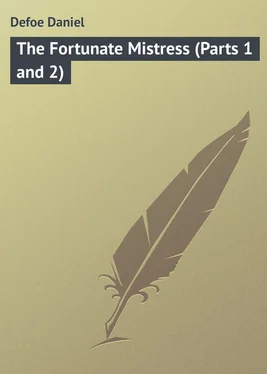Daniel Defoe - The Fortunate Mistress (Parts 1 and 2)
Здесь есть возможность читать онлайн «Daniel Defoe - The Fortunate Mistress (Parts 1 and 2)» — ознакомительный отрывок электронной книги совершенно бесплатно, а после прочтения отрывка купить полную версию. В некоторых случаях можно слушать аудио, скачать через торрент в формате fb2 и присутствует краткое содержание. Жанр: foreign_language, foreign_prose, на английском языке. Описание произведения, (предисловие) а так же отзывы посетителей доступны на портале библиотеки ЛибКат.
- Название:The Fortunate Mistress (Parts 1 and 2)
- Автор:
- Жанр:
- Год:неизвестен
- ISBN:нет данных
- Рейтинг книги:5 / 5. Голосов: 1
-
Избранное:Добавить в избранное
- Отзывы:
-
Ваша оценка:
- 100
- 1
- 2
- 3
- 4
- 5
The Fortunate Mistress (Parts 1 and 2): краткое содержание, описание и аннотация
Предлагаем к чтению аннотацию, описание, краткое содержание или предисловие (зависит от того, что написал сам автор книги «The Fortunate Mistress (Parts 1 and 2)»). Если вы не нашли необходимую информацию о книге — напишите в комментариях, мы постараемся отыскать её.
The Fortunate Mistress (Parts 1 and 2) — читать онлайн ознакомительный отрывок
Ниже представлен текст книги, разбитый по страницам. Система сохранения места последней прочитанной страницы, позволяет с удобством читать онлайн бесплатно книгу «The Fortunate Mistress (Parts 1 and 2)», без необходимости каждый раз заново искать на чём Вы остановились. Поставьте закладку, и сможете в любой момент перейти на страницу, на которой закончили чтение.
Интервал:
Закладка:
It is not only in drawing his characters that Defoe, in The Fortunate Mistress , comes nearer than usual to producing a novel. This narrative of his is less loosely constructed than any others except Robinson Crusoe and the Journal of the Plague Year , which it was easier to give structure to. In both of them – the story of a solitary on a desert island and the story of the visitation of a pestilence – the nature of the subject made the author's course tolerably plain; in The Fortunate Mistress , the proper course was by no means so well marked. The more credit is due Defoe, therefore, that the book is so far from being entirely inorganised that, had he taken sufficient pains with the ending, it would have had as much structure as many good novels. There is no strongly defined plot, it is true; but in general, if a character is introduced, he is heard from again; a scene that impresses itself on the mind of the heroine is likely to be important in the sequel. The story seems to be working itself out to a logical conclusion, when unexpectedly it comes to an end. Defoe apparently grew tired of it for some reason, and wound it up abruptly, with only the meagre information as to the fate of Roxana and Amy that they "fell into a dreadful course of calamities."
G.H. MAYNADIER.
AUTHOR'S PREFACE
The history of this beautiful lady is to speak for itself; if it is not as beautiful as the lady herself is reported to be; if it is not as diverting as the reader can desire, and much more than he can reasonably expect; and if all the most diverting parts of it are not adapted to the instruction and improvement of the reader, the relator says it must be from the defect of his performance; dressing up the story in worse clothes than the lady whose words he speaks, prepared for the world.
He takes the liberty to say that this story differs from most of the modern performances of this kind, though some of them have met with a very good reception in the world. I say, it differs from them in this great and essential article, namely, that the foundation of this is laid in truth of fact; and so the work is not a story, but a history.
The scene is laid so near the place where the main part of it was transacted that it was necessary to conceal names and persons, lest what cannot be yet entirely forgot in that part of the town should be remembered, and the facts traced back too plainly by the many people yet living, who would know the persons by the particulars.
It is not always necessary that the names of persons should be discovered, though the history may be many ways useful; and if we should be always obliged to name the persons, or not to relate the story, the consequence might be only this – that many a pleasant and delightful history would be buried in the dark, and the world deprived both of the pleasure and the profit of it.
The writer says he was particularly acquainted with this lady's first husband, the brewer, and with his father, and also with his bad circumstances, and knows that first part of the story to be truth.
This may, he hopes, be a pledge for the credit of the rest, though the latter part of her history lay abroad, and could not be so well vouched as the first; yet, as she has told it herself, we have the less reason to question the truth of that part also.
In the manner she has told the story, it is evident she does not insist upon her justification in any one part of it; much less does she recommend her conduct, or, indeed, any part of it, except her repentance, to our imitation. On the contrary, she makes frequent excursions, in a just censuring and condemning her own practice. How often does she reproach herself in the most passionate manner, and guide us to just reflections in the like cases!
It is true she met with unexpected success in all her wicked courses; but even in the highest elevations of her prosperity she makes frequent acknowledgments that the pleasure of her wickedness was not worth the repentance; and that all the satisfaction she had, all the joy in the view of her prosperity – no, nor all the wealth she rolled in, the gaiety of her appearance, the equipages and the honours she was attended with, could quiet her mind, abate the reproaches of her conscience, or procure her an hour's sleep when just reflection kept her waking.
The noble inferences that are drawn from this one part are worth all the rest of the story, and abundantly justify, as they are the professed design of, the publication.
If there are any parts in her story which, being obliged to relate a wicked action, seem to describe it too plainly, the writer says all imaginable care has been taken to keep clear of indecencies and immodest expressions; and it is hoped you will find nothing to prompt a vicious mind, but everywhere much to discourage and expose it.
Scenes of crime can scarce be represented in such a manner but some may make a criminal use of them; but when vice is painted in its low-prized colours, it is not to make people in love with it, but to expose it; and if the reader makes a wrong use of the figures, the wickedness is his own.
In the meantime, the advantages of the present work are so great, and the virtuous reader has room for so much improvement, that we make no question the story, however meanly told, will find a passage to his best hours, and be read both with profit and delight.
A HISTORY OF THE LIFE OF ROXANA
I was born, as my friends told me, at the city of Poitiers, in the province or county of Poitou, in France, from whence I was brought to England by my parents, who fled for their religion about the year 1683, when the Protestants were banished from France by the cruelty of their persecutors.
I, who knew little or nothing of what I was brought over hither for, was well enough pleased with being here. London, a large and gay city, took with me mighty well, who, from my being a child, loved a crowd, and to see a great many fine folks.
I retained nothing of France but the language, my father and mother being people of better fashion than ordinarily the people called refugees at that time were; and having fled early, while it was easy to secure their effects, had, before their coming over, remitted considerable sums of money, or, as I remember, a considerable value in French brandy, paper, and other goods; and these selling very much to advantage here, my father was in very good circumstances at his coming over, so that he was far from applying to the rest of our nation that were here for countenance and relief. On the contrary, he had his door continually thronged with miserable objects of the poor starving creatures who at that time fled hither for shelter on account of conscience, or something else.
I have indeed heard my father say that he was pestered with a great many of those who, for any religion they had, might e'en have stayed where they were, but who flocked over hither in droves, for what they call in English a livelihood; hearing with what open arms the refugees were received in England, and how they fell readily into business, being, by the charitable assistance of the people in London, encouraged to work in their manufactories in Spitalfields, Canterbury, and other places, and that they had a much better price for their work than in France, and the like.
My father, I say, told me that he was more pestered with the clamours of these people than of those who were truly refugees, and fled in distress merely for conscience.
I was about ten years old when I was brought over hither, where, as I have said, my father lived in very good circumstances, and died in about eleven years more; in which time, as I had accomplished myself for the sociable part of the world, so I had acquainted myself with some of our English neighbours, as is the custom in London; and as, while I was young, I had picked up three or four playfellows and companions suitable to my years, so, as we grew bigger, we learned to call one another intimates and friends; and this forwarded very much the finishing me for conversation and the world.
Читать дальшеИнтервал:
Закладка:
Похожие книги на «The Fortunate Mistress (Parts 1 and 2)»
Представляем Вашему вниманию похожие книги на «The Fortunate Mistress (Parts 1 and 2)» списком для выбора. Мы отобрали схожую по названию и смыслу литературу в надежде предоставить читателям больше вариантов отыскать новые, интересные, ещё непрочитанные произведения.
Обсуждение, отзывы о книге «The Fortunate Mistress (Parts 1 and 2)» и просто собственные мнения читателей. Оставьте ваши комментарии, напишите, что Вы думаете о произведении, его смысле или главных героях. Укажите что конкретно понравилось, а что нет, и почему Вы так считаете.












